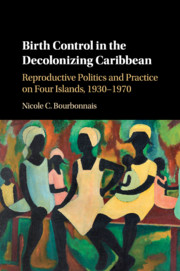 Birth Control in the Decolonizing Caribbean
Birth Control in the Decolonizing Caribbean Book contents
- Frontmatter
- Dedication
- Contents
- List of Figures, Maps, and Tables
- Acknowledgments
- List of Acronyms
- Introduction
- 1 The Answer, an Aid, a Right: Birth Control Debates and Social Movements in the Caribbean
- 2 From Politics to Practice: The Colonial Office, Foreign Activists, and Local Family Planning Clinics
- 3 Beyond Culture or Choice: Working-Class Families and Birth Control Clinics
- 4 A Matter of Cost: Reproductive Politics, State Family Planning Programs, and Foreign Aid in the Transition to Independent Rule
- Conclusion
- Bibliography
- Index
1 - The Answer, an Aid, a Right: Birth Control Debates and Social Movements in the Caribbean
Published online by Cambridge University Press: 06 January 2017
- Frontmatter
- Dedication
- Contents
- List of Figures, Maps, and Tables
- Acknowledgments
- List of Acronyms
- Introduction
- 1 The Answer, an Aid, a Right: Birth Control Debates and Social Movements in the Caribbean
- 2 From Politics to Practice: The Colonial Office, Foreign Activists, and Local Family Planning Clinics
- 3 Beyond Culture or Choice: Working-Class Families and Birth Control Clinics
- 4 A Matter of Cost: Reproductive Politics, State Family Planning Programs, and Foreign Aid in the Transition to Independent Rule
- Conclusion
- Bibliography
- Index
Summary
Several members of the Board of Health have become particularly apprehensive that this island will soon be over-populated by the Coloured people, and are eager to experiment on some method of birth control, but they know not how to direct their altruistic efforts. … I am accordingly to ask if you sometime will be good enough to inquire from the Secretary of State for the Colonies if there has been any successful experience in stemming the multiplication of negro people, improbable though it be.
– Henry Wilkinson, Bermuda, 1933No one is suggesting that birth control is the immediate solution to a problem which is largely economic, but surely birth control is an aid, a fortification against the deterioration of a social condition in the future. If now, you can plan for your family, to educate, feed and by example to live a moral life by providing a suitable environment, then surely you will be well on the way to bring about this Spiritual awakening, strength of mind and character and such forces.
– John Beckles, Barbados, 1941Through Birth Control Clinics, the women of Jamaica will secure the necessary knowledge, so easily obtained by those who are able to pay private physicians. Many women will acquire a general knowledge of the care of their bodies … which would be a great contribution to family welfare. Why not give a fair chance to every child that is born; and the right to every woman of voluntary parenthood?
– Maymie L. Aiken, Jamaica, 1939Henry Wilkinson, John Beckles, and Maymie L. Aiken were three Caribbean actors located in quite different positions within the colonial class, race, and gender hierarchy, but they shared a concern over reproduction and a faith in modern birth control technology. Wilkinson, a white Bermudian health reformer who served as the island's chief medical officer at the time, portrayed birth control as a means to stymie “overpopulation” of an expanding “negro” population. Beckles, a prominent middle-class black Barbadian social worker, envisioned family planning as a tool to help improve economic and social conditions for the island's most impoverished citizens. Maymie L. Aiken, a working-class activist prominent within the Universal Negro Improvement Association (UNIA) and local labor movements, viewed the issue in a somewhat more radical light.
- Type
- Chapter
- Information
- Birth Control in the Decolonizing CaribbeanReproductive Politics and Practice on Four Islands, 1930–1970, pp. 30 - 75Publisher: Cambridge University PressPrint publication year: 2016
